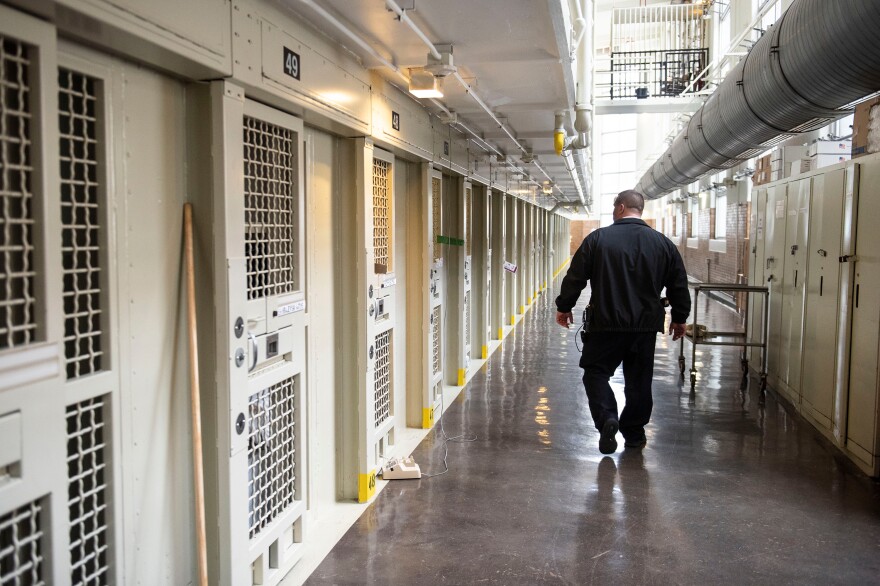Incarcerated individuals do not qualify for a coronavirus vaccine under Iowa’s recently expanded eligibility rules, according to the state Department of Corrections. That’s despite “thousands” of inmates having pre-existing conditions that put them at an elevated risk of severe COVID-19.
As of this week, Iowans under the age of 65 who have certain preexisting conditions can qualify for the life-saving coronavirus vaccine. That is, as long as they’re not incarcerated.

In January, the Department of Corrections began administering about 1,300 doses of the vaccine to some critical staff and some of the highest-risk inmates, including those with cancer, HIV, hepatitis C, COPD and other conditions, according to a spokesperson.
But that allotment fell far short of what’s needed. According to the department, “thousands” of incarcerated individuals have underlying conditions that put them at an elevated risk for severe COVID.
“While we have thousands of inmates with preexisting conditions that make them a higher risk for complications due to COVID-19, we focused the limited vaccines that we received on those with the most serious chronic health issues in addition to our staff serving in the highest-risk areas of the prisons,” DOC spokesperson Cord Overton wrote in an email. “The majority of these individuals are located in one of the hospital wings of our medical prison in Coralville.”
Thursday IA COVID-19 numbers
— Natalie Krebs (@natalie_krebs) March 11, 2021
(from Wed 10 a.m. to Thurs 10 a.m.)
412 new cases
Total: 341,421
19 new deaths
Total: 5,620
166 hospitalized
963,787 number doses administered
328,332 individuals fully vaccinated*
*This category now includes J&J vax@IowaPublicRadio
Overton and IDPH spokesperson Sarah Ekstrand said this initial allotment to the DOC was not a violation of state guidelines, which put incarcerated individuals and staff in a later eligibility block, because the prisons functionally serve as a long term care facility for many incarcerated patients.
“It was a collaborative decision between state agencies to send allocation to DOC facilities,” Ekstrand wrote in an email. “The targeted population in January was consistent with the Phase 1-A eligibility criteria for persons in health care settings, or long term care residents and staff.”
Vaccinations for health care personnel and residents and staff of long term care facilities began last December, under Phase 1A of the state’s plan.
Overton did not answer questions from IPR about how many of the 1,300 doses went to staff and how many to incarcerated individuals, or confirm which facilities received shots.
We asked people in prison how they feel about getting the COVID-19 vaccine. Many respondents harbor a deep distrust of medical staff. Misinformation abounds, and officials have moved slowly to explain the vaccine’s benefits and risks.https://t.co/Uq4em4yz99
— The Marshall Project (@MarshallProj) March 12, 2021
In January, nearly half of the department’s prison workers said they wouldn’t get the vaccine, according to an internal survey.
Some inmates at the Anamosa State Penitentiary got leftover doses of the vaccine when staffers refused it, according to a message from an incarcerated individual that was shared with IPR.
“We know that the few older guys got the vaccine, as well as the incarcerated that work on that unit to take care of them,” said Johnny Pippins, according to a message his loved one shared with IPR. “There were also a handful of incarcerated that happened to be present when some staff turned it down, so it was offered to them as not to waste it. Those are the only ones that I know of.”
The rest of Iowa’s incarcerated population and corrections staff won’t qualify for a vaccine until Phase 1B Tier 5, though Overton granted that some employees may become eligible under the recently-expanded guidelines.
“The state's moving into the next tier of vaccine eligibility should allow many additional members of our staff both in the prisons and the community based corrections districts to receive the vaccine, if they apply,” Overton wrote in an email. “We'll be doing our best to keep track of this information for our own reporting purposes. We will continue to patiently await the state's transition to Tier 5 for the majority of our population to receive their vaccinations.”
The state's largest county said some appointments for those under 65 with underlying conditions will be available at county hospitals and select Medicap pharmacies starting Monday.
— Iowa Public Radio (@IowaPublicRadio) March 11, 2021
More from @natalie_krebs >>>https://t.co/Z2fTcOCtDR
It’s not clear when the state will clear the rest of incarcerated individuals for vaccinations, even as research indicates many inmates across the country suffer from preexisting conditions for which they don’t receive needed care, raising further concerns of their elevated risk.
A nationwide survey of incarcerated individuals published in 2009 found they’re more likely than the general public to have certain chronic conditions like diabetes, hypertension and asthma, conditions which may put them at an elevated risk of severe COVID.
The study, published in the American Journal of Public Health, also found “[m]any inmates with a serious chronic physical illness fail to receive care while incarcerated."
Iowa’s prisons saw multiple explosive and deadly outbreaks of the coronavirus over the past year, with thousands of staffers and incarcerated individuals falling sick. The high number of positive cases and nearly round-the-clock lockdowns significantly hampered the basic operations of some prisons, which rely heavily on incarcerated individuals for cooking and laundry, among other jobs.
As of Thursday, more than 4,700 inmates and nearly 700 staffers had tested positive for COVID, with the vast majority considered recovered, according to department statistics. Nineteen inmates and two staffers have died of disease.









